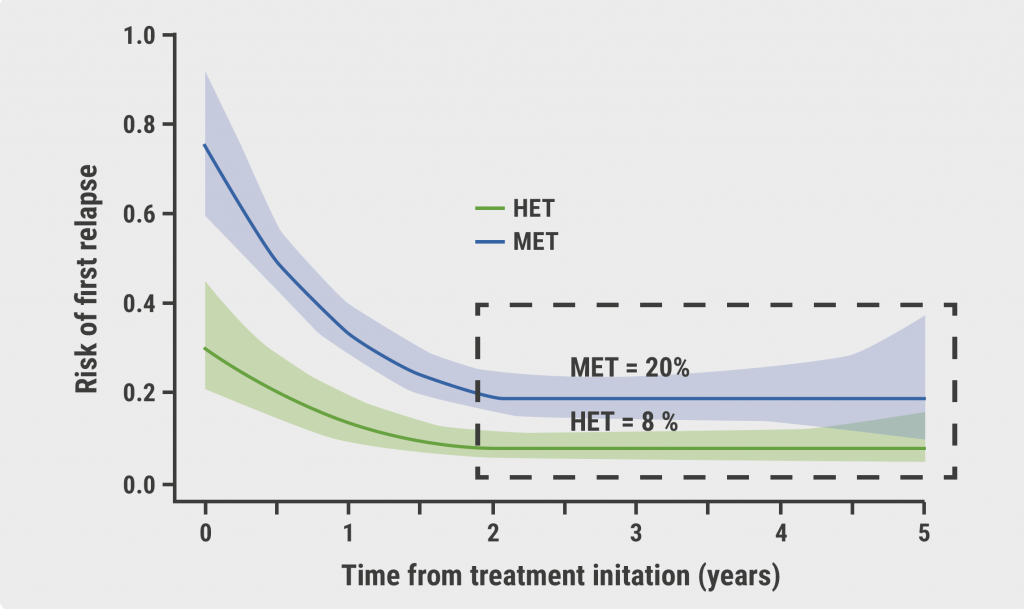https://doi.org/10.55788/bacb626c
The main SFSEP recommendations were presented by Prof. Sandra Vukusic (University Hospital Lyon, France) and were published soon after [1,2]. NMOSD represents a distinct pathophysiological entity with very little literature on pregnancy. Still, there was a strong agreement on all 66 proposed recommendations. Prof. Vukusic focused on the most important recommendations, including the following:
- Pregnancy is not contraindicated in women with NMOSD. However, pregnancy planning should be favoured during a period of inactivity of the disease for at least 12 months.
- It is recommended to carry out a reinforced obstetric follow-up, with an expert neurological team, in women with NMOSD. “The reason for this is the high prevalence of autoimmune disorders in women with NMOSD that can have implications for obstetric outcomes,” Prof. Vukusic explained,
- It is recommended to inform patients of the increased risk of miscarriage and pre-eclampsia in case of AQP4-antibody-seropositive status, and to plan for obstetric follow-up by an experienced team.
- Breastfeeding is not contraindicated, but it is recommended to discuss this topic and when to resume immunoactive treatment, considering the patient's preferences and disease activity, and reminding the patient of the importance of rapid resumption of the treatment (because of the severity of relapses in NMOSD).
- Relapse management during pregnancy and breastfeeding is the same as when not pregnant.
- There is no evidence for specific, postpartum therapy to prevent relapses, but if immunoactive therapy was stopped, then an early restart after childbirth is recommended, because of the high risk and severity of those relapses.
- It is recommended to not use anti-CD20 therapy (off-label rituximab) during pregnancy. A 2-month delay is recommended between the last infusion and terminating contraception.
- Azathioprine can be continued during pregnancy if need be.
- Mycophenolate mofetil is contraindicated during pregnancy. There should be 6 weeks between the last dose and stopping contraception.
- The use of eculizumab during pregnancy is not recommended. There should be 3 months between the last infusion and stopping contraception.
- Available evidence on eculizumab during pregnancy is lacking; data from other indications are reassuring, according to Prof. Vukusic.
- Vukusic S, Marignier R, Ciron J, et al. Pregnancy in women with neuromyelitis optica spectrum disorders: recommendations from the French multiple sclerosis society. Abstract O052, ECTRIMS 2022, 26–28 October, Amsterdam, the Netherlands.
- Vukusic S, et al. Mult Scler. 2022;13524585221130934.
Copyright ©2022 Medicom Medical Publishers
Posted on
Previous Article
« Pregnancy and infant outcomes in women receiving ocrelizumab Next Article
NMOSD patients are cognitively impaired regardless of serostatus »
« Pregnancy and infant outcomes in women receiving ocrelizumab Next Article
NMOSD patients are cognitively impaired regardless of serostatus »
Table of Contents: ECTRIMS 2022
Featured articles
Letter from the Editor
Diagnosis and Prediction of Disease Course
A case for including optic nerve lesions in the McDonald criteria
Cerebrospinal fluid kappa-free light chains for MS diagnosis
Early, non-disabling relapses increase disability accumulation
Physical impairment is present before perceived MS onset
Chronic active MS lesions respond poorly to anti-CD20 antibodies
Treatment: Trials & Strategies
Dimethyl fumarate reduces the risk of a first clinical event in RIS
How and when to make a timely switch to high-efficacy DMT
Comparing real-world effectiveness of DMTs
Study fails to show non-inferiority of rituximab to ocrelizumab
Autologous haematopoietic stem cell transplantation versus DMTs
Progressive MS
Stem cell transplantation not superior to natalizumab in progressive MS
Efficacy of DMTs fades away in secondary progressive MS
Smartphone tapping can help detect progressive MS
Paediatric MS
Early treatment with DMT effective in paediatric-onset MS
Fingolimod in paediatric MS: results of up to 6 years
Switching treatment after initial platform injectable DMT: real-world data
Pregnancy
Pregnancy and infant outcomes in women receiving ocrelizumab
New safety data of anti-CD20 mAbs around pregnancy
MS activity and pregnancy outcomes after long-term use of natalizumab
NMOSD
Ravulizumab significantly reduced relapses in AQP4+ NMOSD
NMOSD patients are cognitively impaired regardless of serostatus
Evidence-based consensus on pregnancy in NMOSD
COVID-19
COVID-19 and MS: lessons learned thus far
Ocrelizumab and fingolimod increase the risk of COVID-19 and of worse outcomes
Humoral and cellular immune responses after SARS-CoV-2 vaccination
Miscellaneous
Re-myelination strategies in MS still pose many unanswered questions
MS associated with a broader Epstein-Barr virus specific T-cell receptor repertoire
Cognitive rehab and mindfulness reduce cognitive complaints in MS
Related Articles
September 7, 2023
Retinal layer thickness predicts disability accumulation in early RMS
December 9, 2021
Dynamic scoring system aids decision to switch MS therapies early

December 4, 2023
Prioritising high efficacy therapies in children with MS
© 2024 Medicom Medical Publishers. All rights reserved. Terms and Conditions | Privacy Policy
HEAD OFFICE
Laarderhoogtweg 25
1101 EB Amsterdam
The Netherlands
T: +31 85 4012 560
E: publishers@medicom-publishers.com

